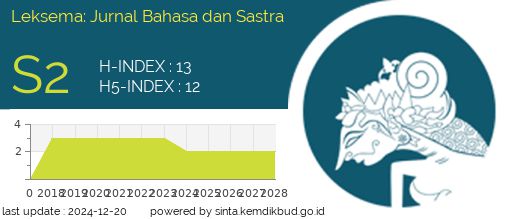ENGLISH NOUN PHRASES OF NARRATIVE TEXT AND NEWS ARTICLE: A CONTRASTIVE ANALYSIS
DOI:
https://doi.org/10.22515/ljbs.v8i1.6176Keywords:
contrastive analysis, narrative text, news article, noun phraseAbstract
Noun phrases, in either language in general or English in particular, are one of the pivotal topics in formal linguistics. This paper aimed to contrast the similarities and differences of the patterns of ideational structure and syntactic functions of noun phrases in two different text genres. It employed systemic functional linguistic approach using both Ideational structure analysis and syntactical analysis of noun phrases in narrative texts and news articles. The findings of this study show that noun phrases in narrative texts tend to be shorter and simpler, especially as they occupy the subject and object functions. The forms of pre-modifiers used also tend to be simpler (ranging from the use of one or two pre-modifiers only). The same case occurs in post-modifier forms as well. In contrast, news articles tend to use complex phrase structures (two or even three pre-modifiers at once) which are coupled with other complex information in the post-modifiers. Appositives appear several times as post-modifiers to complete the information in the noun phrases. In conclusion, these differences prove that the determinism of writing style in each genre has a significant share in determining the pattern complexity of the noun phrase structures therein.
Downloads
References
Adebileje, Adebola. 2016. “Forms and Functions of the English Noun Phrase in Selected Nigerian Texts.” IOSR Journal of Humanities and Social Sciences 21 (2): 45–49.
Akinlotan, Mayowa and Alex Housen. 2017. “Noun Phrase Complexity in Nigerian English.” English Today 33 (3): 31–38. https://doi.org/10.1017/S0266078416000626.
Allen, Cynthia L. 2016. “The Definite Determiner in Early Middle English: What Happened with Þe?” In Let Us Have Articles Betwixt Us–Papers in Historical and Comparative Linguistics in Honour of Johanna L. Wood. Aarhus: Department of English, School of Communication and Culture, Aarhus University.
Biber, Douglas and Susan Conrad. 2019. Register, Genre, and Style. Cambridge: Cambridge University Press. https://doi.org/10.1017/9781108686136.
Biber, Douglas, Stig Johansson, Geoffrey N. Leech, Susan Conrad, and Edward Finegan. 2021. Grammar of Spoken and Written English. Amsterdam: John Benjamins Publishing Company. https://doi.org/10.1075/z.232.
Chomsky, Noam. 1957. Syntactic Structures. Berlin: De Gruyter Mouton. https://doi.org/10.1515/9783112316009.
Dowty, David R. 1979. Word Meaning and Montague Grammar. Vol. 7. Dordrecht: Springer Netherlands. https://doi.org/10.1007/978-94-009-9473-7.
Fang, Alex Chengyu and Jing Cao. 2015. Text Genres and Registers: The Computation of Linguistic Features. Berlin/Heidelberg: Springer Berlin Heidelberg. https://doi.org/10.1007/978-3-662-45100-7.
Fillmore, Charles J. 1968. “The Case for Case.” In Emmond Bach and Robert T. Harms (eds.). Universals in Linguistic Theory: 1–88. New York: Holt, Rinehart and Winston.
Halliday, Michael Alexander Kirkwood and Christian MIM Matthiessen. 2014. Halliday’s Introduction to Functional Grammar. Abingdon: Routledge.
Huddleston, Rodney and Geoffrey K Pullum et al. 2012. The Cambridge Grammar of the English Language. Cambridge: Cambridge University Press.
Latorre, G. and H. Pons. 1989. “Pedagogic Models of the English Complex Noun Phrase: A Comparison between Registers.” In Pat Wilcox Peterson (ed.). ESP in Practice: Models and Challenges for Teachers: 99–108. Washington: United States Information Agency.
Millaku, Shkelqim, Xhevahire Millaku and Teuta Kafexholli. 2022. “The Nominal Clause and the Noun Phrases: A Comparative Study of Albanian and English.” World Journal of English Language 12 (2): 352. https://doi.org/10.5430/wjel.v12n2p352.
Morley, G. David. 2004. “On Group and Phrase in Functional Grammar.” Word 55 (2): 217–26. https://doi.org/10.1080/00437956.2004.11432547.
Mufwene, Salikoko S. 2021. “The Structure of the Noun Phrase in African-American Vernacular English.” In Salikoko S. Mufwene, John R. Rickford, Guy Bailey and John Baugh (eds.) African-American English: Structure, History, and Use. London: Routledge. https://doi.org/10.4324/9781003165330.
Noguera-Díaz, Yolanda, and Pascual Pérez-Paredes. 2019. “Register Analysis and ESP Pedagogy: Noun-Phrase Modification in a Corpus of English for Military Navy Submariners.” English for Specific Purposes 53 (January): 118–30. https://doi.org/10.1016/j.esp.2018.06.002.
Olsen, Mari B. 1994. “The Semantics and Pragmatics of Lexical Aspect Features.” Studies in the Linguistic Sciences 24: 361–75.
Olsen, Mari B. 2016. A Semantic and Pragmatic Model of Lexical and Grammatical Aspect. New York: Routledge. https://doi.org/10.4324/9781315052267.
Quirk, Randolph, Geoffrey Leech, Jan Svartvik and Sidney Greenbaum. 1985. A Grammar of Contemporary English. London: Longman.
Ruan, Zhoulin. 2018. “Structural Compression in Academic Writing: An English-Chinese Comparison Study of Complex Noun Phrases in Research Article Abstracts.” Journal of English for Academic Purposes 36 (November): 37–47. https://doi.org/10.1016/j.jeap. 2018.09.001.
Schilk, Marco and Steffen Schaub. 2016. “Noun Phrase Complexity Across Varieties of English.” English World-Wide. A Journal of Varieties of English 37 (1): 58–85. https://doi.org/10.1075/eww.37.1.03sch.
Thomas, Linda. 2005. Beginning Syntax. Oxford: Blackwell Publishing.
van Valin, Robert D and Randy J LaPolla. 1997. Syntax: Structure, Meaning and Function. Cambridge: Cambridge University Press. https://doi.org/10.1017/CBO9781139166799.
Vendler, Zeno. 1967. Linguistics in Philosophy. New York: Cornell University Press. https://doi.org/10.7591/9781501743726.
Yoo, Isaiah WonHo and Yu Kyoung Shin. 2020. “Determiner Use in English Quantificational Expressions: A Corpus‐Based Study.” TESOL Quarterly 54 (1): 90–117. https://doi.org/10.1002/tesq.539.
Downloads
Published
Issue
Section
License
Copyright (c) 2023 Leksema: Jurnal Bahasa dan Sastra

This work is licensed under a Creative Commons Attribution-NonCommercial-ShareAlike 4.0 International License.
The copyright of the received article shall be assigned to the publisher of the journal. The intended copyright includes the right to publish the article in various forms (including reprints). The journal maintains the publishing rights to published articles.
In line with the license, the authors and users (readers or other researchers) are allowed to share and adapt the material only for non-commercial purposes. In addition, the material must be given appropriate credit, provided with a link to the license, and indicated if changes were made. If authors remix, transform or build upon the material, authors must distribute their contributions under the same license as the original.








